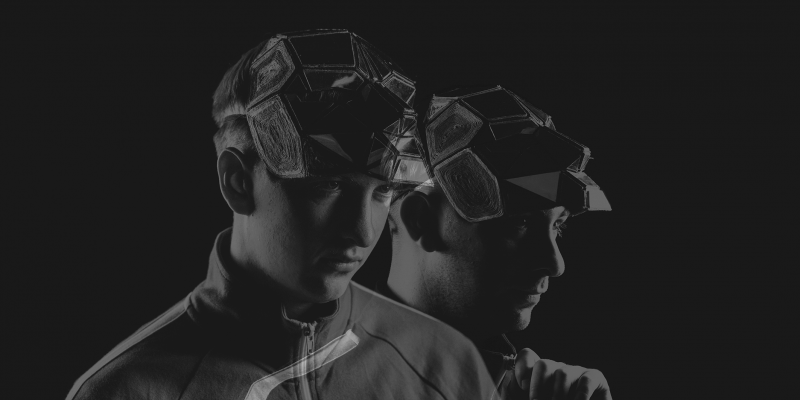
Todd and Guy Speakman sit facing me in their hand-built studio, surrounded by vintage synthesisers, coils of wires and a mattress taped to the ceiling, backed by a massive mixing desk and a single psychedelic poster at the room’s head. Tucked away in North London, its occasionally aggressive surroundings have alarmed the boys’ visitors over the past five years, but the inside has been perfect’ ‘we can have parties here, we can stay up all night doing stuff.’ Speakman Sound are brothers who share total musical submersion but differ in so many ways. Guy is younger, his hair is shorter, he wears a hoodie, loves electronic music and doesn’t quite get some of the free Jazz records in Todd’s collection, whereas Todd wears a battered blazer and jumps at the opportunity to suggest what elements of Jazz work for Guy, ‘we share similar intuitions because the sounds in it are quite like what Dad [who has played with British Psychedelic bands such as hawkwind] used to play, lots of weird bells.’ Of course I can’t let this go without clarification, bells? ‘Yeah he’s covered the roof of his man-den in CDs, got a papier-mâché head coming out of the walls, a massive Marshall stack in this tiny room. He’s very much a cosmic dude, he enjoys creating mystical narratives.’ Guy and Todd’s music brings this joyous idealism into the present day, weaving bass, house, jazz and soul into a sonic fever dream, best showcased by the short film made alongside their recent LIMBIC EP.
You’ve done educational work around music, what was that?
T: I’ve been teaching drums and music for years, but I’ve worked in young offenders’ institutes and prisons up and down the country for about 8 years with HMDT Music. I work with boys when they’re inside, and when they’re released we can offer them work experience and stuff. The music side of it is mostly like a disguise of general mentoring Therapy.
T: Exactly, The music is there to get them here (the studio) and to be on a level together. And then it’s everything you can do underneath that. really for a boy leaving prison aged 18 or 19, just turning up here is something.
And the mental thing of acceptance and breaking separation?’
T: Yeah yeah yeah, and just in general that’s a big part of like, the philosophies of what we’re doing, we’re not just making music to self indulge, there’s a big part of music that’s important to the human world.
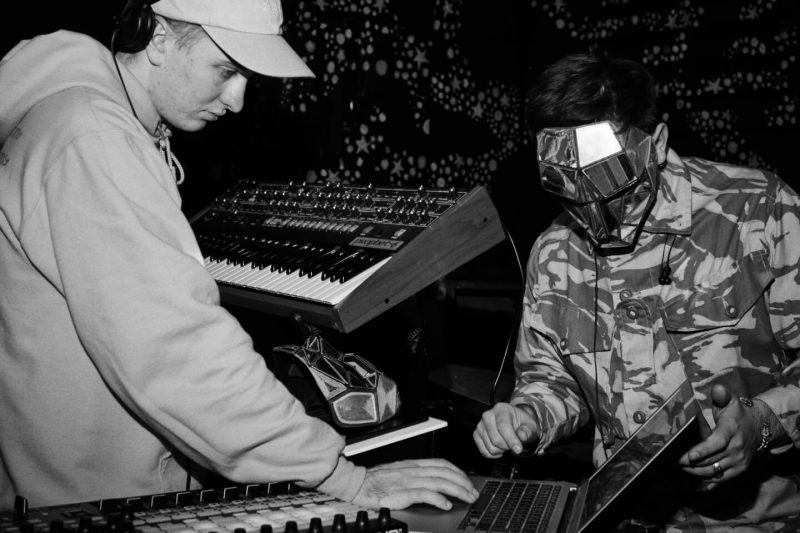
In Thom Yorke’s Desert Island Discs, he talks of how music is one of the most important ways in the world that allow people to interact, as opposed to just being content. Aside from the anti-capitalism, I thought it was so interesting to separate making entertaining content from involvement in something, something which when done correctly is deeply important.
T: Yeah, the process of music, of creating, sharing or even just listening. For us it’s a lifestyle. Like everything around us, it’s not like we’re only producers who make music, music is our output to the world… Jesus that sounds pretentious haha… And yeah it’s a uniquely human thing, there are subconscious messages from the collective conscience of humanity in music, whenever you create something it’s not ‘your’ idea alone.
The film you made alongside the Limbic EP involves clips from Printworks, Lovebox and a bunch of other events, have you had meaningful experiences at any of those events, experiences that demonstrate this significance?
T: Festivals in general are important to us, Guy went to one when he was three days old, we spent a lot of time living in a van, going to festivals. Our parents were sort of old school hippies, in the good sense; they did the whole ‘live in the woods thing’ properly, they brought up children and they’re still together, they’re really wonderful parents. But yeah, the whole point of that little film that we did, the background to it was just, how unique festivals are, or, I guess, more how interesting they are.
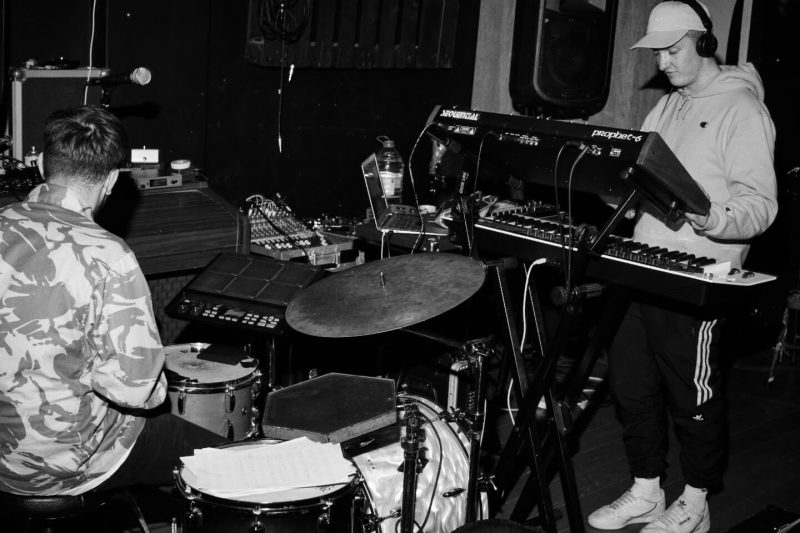
If you’re someone who goes to one festival this summer then that will be fucking unique to you, even if you’ve been going to different areas in Britain and going on holiday, it’s totally different.
T: Yeah there’s something about how you float through festivals, the hedonism and everything, there’s this deep sense of intuition, the animalistic side of people, that sounds really satanic haha… but it’s more like… the reason it’s called Limbic is because the limbic part of the mind is the part that deals with emotion, it’s a bit more ancient, in terms of makeup it’s older, we’ve had it for longer than we’ve had the thalamus and other regions, which deals with a lot of rational thinking. The newer part was developed along with language, which has helped us rationalise and understand the world in a deeper way than we did before, but sometimes I feel one can miss the understanding of not understanding. I love both sides; I’m really into science and really grateful to stand on the shoulders of all those intelligent people who have come before us, but at the same point, I love sitting on my drums, being in the moment and playing a gig, and with that, I don’t know what the hell is going on, it’s happening to me, a little bit like being at the stone circle at 7am at Glastonbury… hahah
Yeah just not talking for a second. Like when you’re talking, you’re trying to work out how to communicate in a way that’s appropriate, that won’t offend people, weird them out, bore them, so much stuff separate to just expressing yourself. I’ve tried to learn as a writer to filter out all of that, and just write and express yourself, and that’s a really long project, whereas with music you can just be yourself, immediately. I love that about musical tastes, when someone shares a track that just makes so much sense coming from them, when you can see their natural rhythm in it. That was supposed to be a question…
T: You asked me about whether I can identify a specific experience earlier, it’s really hard to pin it down to one, but the process of Glastonbury festival, every time we’re there. We grew up in Glastonbury so there’s a thing about it… it’s just so wonderful to see so many people interacting, even when it’s negative it’s just interesting.
It’s a social lab ideally, a place to test out what can life be like.
T: Definitely. There is also a personal side of this video that we’ve created is, I’m definitely feeling this new contradiction as I head towards the end of my 20s, the slight destruction of the child I’ve been and the adult I’m becoming – or am. It’s is a really similar contradiction I feel between those two sides of my brain I mentioned before.
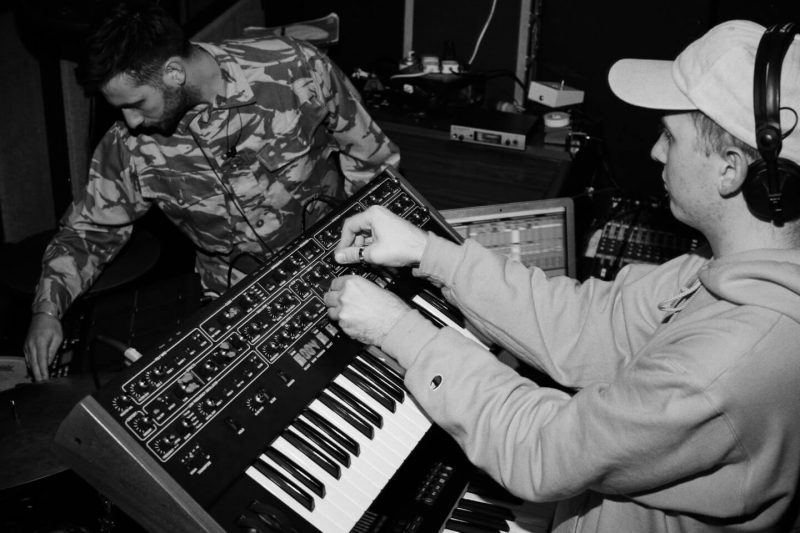
Yeah you can mould those two sides, but it’s not easy to find.
T: And that’s the thing about festivals, the core of it that’s youth culture, same with raving, I still love it but there’s that part of you that starts to feel slightly separate from the culture of it.
My favourite part of the video was the vertical iPhone clip of birds flying in unison, I so recognise that situation of standing outside watching that and thinking man, can’t I just stay here, can’t I stay immersed in music and nature?
T: There’s something symbolic in it as well, in that you look up and they fly away. But all of that meaning, it’s the stuff no one’s going to see. That’s what we thought we meant, when we created it, but we don’t care if that’s what’s taken away by anyone else, if it’s just a real abstract piece to them, that’s cool.
You both have lyric credits on the EP, in contrast to the instrumental dance you specialise in, how has that been?
T: It’s actually been a really painful process. There’s a sort of pop writing thing where singers write about a relationship or something over a song, and we’ve discovered that – even if they’re really great singers – it’s something I just can’t do. I’m way too precious with words, unless there’s been a process where there’s a relationship between ourselves and the artist and they’ve said something really interesting. We collaborate a lot with my partner Sharky, which has allowed me a space to explore lyric writing, again another process I don’t particularly want to do so much, as I’m not a writer.
What does she bring to the table?
T: She’s a very intuitive lyricist. Sometimes she writes lyrics without understanding how deep what she just wrote is; like this song she did [with Speakman Sound produced] about 4 years ago called Hawaii, she wrote it quite honestly about this experience of watching a film and wishing she lived there, but the way she personally wrote it was captured this really deep position that most people can get into, of lying to yourself about how things could be better. Thom Yorke’s very good at that, he’s got lines like ‘I woke up sucking on lemons’, something like that means nothing, but absolutely everything at the same time.
Yeah it’s just being lucid as a lyricist, not getting in the way of your own words.
T: Yeah and I’m really shit at that, the ideas I wanna explore, they end up very quickly being pretentious, and not very connective; I’m not a poet, I just wanna think and work through things. But she’s got this element, so I’d chuck down phrases and the overall concept and she’d make it poetic. Guy’s role with the lyrics was really interesting, because his philosophy is there but he’s not always trying to externalise it like me. So Sharky provided the form, and Guy was like the type editor.
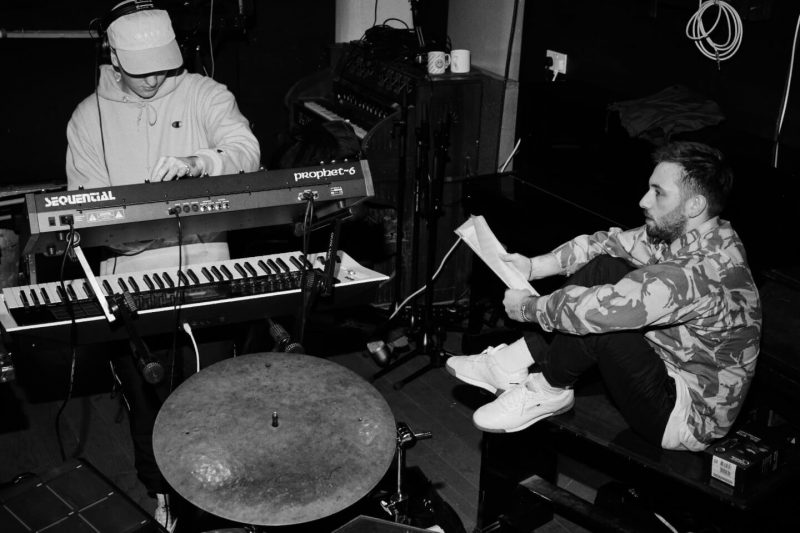
Like telling you I’m not inside your brain, this bit doesn’t make sense.
T: Yeah or like, that sounds shit. Because he’s coming more from the sonic side of things.
You can hear as a fan of music when that hasn’t happened, when lovely producer has put some lovely vocals over lovely beats, but there’s no deeper communication between them. It’s a really fine line, like SBTRKT has done some of my favourite tracks of all time, but there have been some points on his recent stuff that just feel a bit doctored, like using vocalists to soften the beats.
T: It’s really hard when you’re trying to make music to go out there and connect, to really stick to where you’re going, because you listen to things and people and everything, you try to play the game; the sounds and tempos that are connecting. It’s so easy to get bogged down in that and make great sounding stuff that has no feeling.
Do you have any sonic parts of the EP that you particularly love, above and beyond the concept?
G: For some reason I’ve got a little soft spot for the end of Lost Boys, the West Coast synth line.
T: I really like what we achieved with the sonic of Curve, the way the horns are stacked. I remember before we’d put horns on it, I remember sitting there going ‘this idea really needs that harmony’, and then we did it and it’s like the idea is completed.
Have there been any particular points, Guy, when the concept has really broken through for you?
G: Umm, yeah maybe, sometimes?
T: You don’t really think like that.
G: Yeah I’m just sort of, in the music.